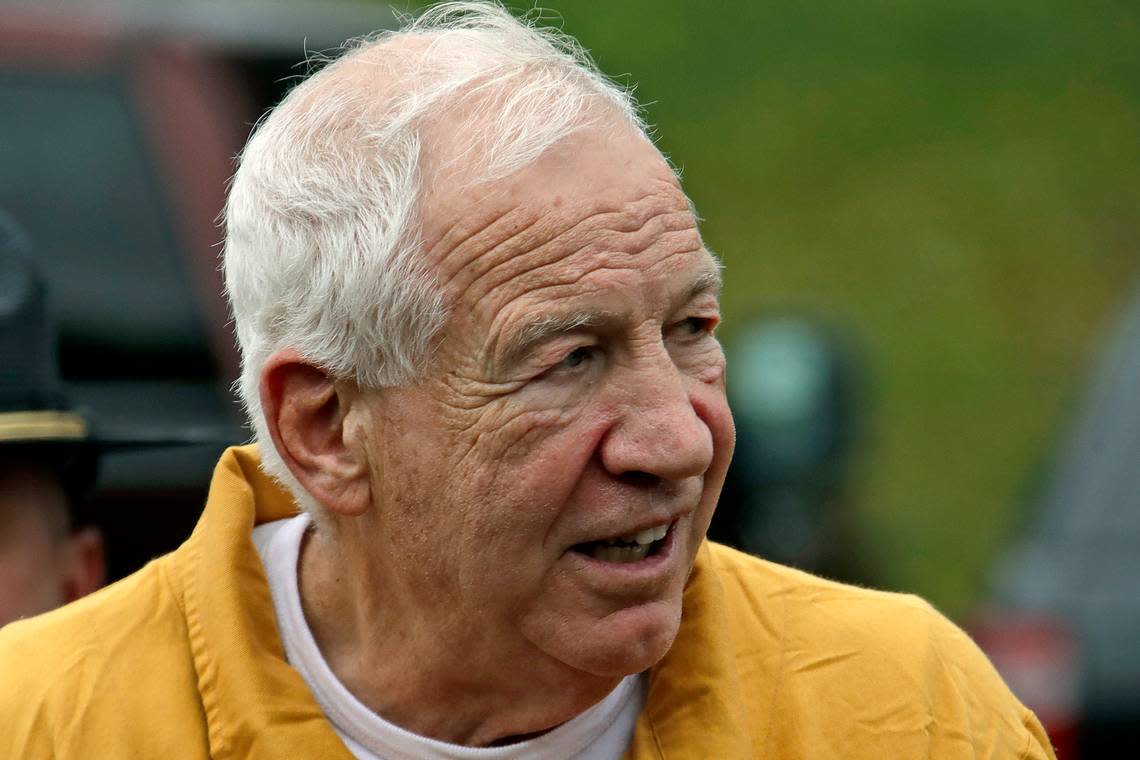Sandusky ordered to pay nearly $45K as former Penn State assistant coach pushes for new trial

A judge handed convicted child sexual offender Jerry Sandusky a loss Thursday to one of his legal challenges and deferred ruling on another that his legal team hopes can lead to a new trial.
Judge Maureen Skerda ordered the former Penn State assistant football coach to pay nearly $45,000 to cover the costs incurred as part of his preliminary hearing and trial more than a decade ago.
Bellefonte police Chief Shawn Weaver testified Thursday about the months of work that went into planning for the most high-profile case in Centre County history.
The Bellefonte Area School District, Centre County Emergency Management Agency and the state Transportation Department were among those consulted. Students were escorted, roads were shut down and a police K-9 was used to search the courthouse for explosives.
The Pennsylvania State Police used a helicopter to track Sandusky as he was transported to the courthouse, where Weaver said “sharpshooters” were stationed on the roof.
Nearly $23,000 of the amount Sandusky was ordered to pay is set to go toward overtime racked up by officers. Weaver said the amount is “way lower” than what was paid out, estimating it is only one-fourth of the actual cost.
“It was a very hectic morning every day,” Weaver said.
Sandusky, 79, attended the hearing by Zoom. Lawyer Al Lindsay said Sandusky did not attend the hearing in person because of “health issues.”
“Jerry, like myself, we’re getting older. I once told Jerry that I need to get this resolved before he dies; now I’m worried about whether I get it resolved before I die,” the 77-year-old lawyer said. “His health is not as good as it was.”
Sandusky said little Thursday, except answering routine questions from Skerda or saying the internet connection made it difficult for him to hear what was said.
About two dozen people were in the courtroom. The group included Sandusky’s wife, Dottie, Penn State trustee Anthony Lubrano and former university vice president Gary Schultz.
Each listened as Lindsay pushed Skerda for an opportunity to present the testimony of license psychologist R. Christopher Barden, someone Sandusky’s legal team hopes could address the “radical changes” in the testimony of his victims.
Lindsay’s hope is Barden’s testimony could deliver enough evidence to warrant a new trial.
Skerda, at times, appeared unimpressed. She described Barden’s report as “scattershot” and at one point told Lindsay she was confused by his argument. It’s unclear when she may hand down her ruling.
After the hearing Lindsay reiterated his belief that the prosecution of Sandusky is the worst thing to happen in the United States since the Salem Witch Trials.
“We’re in for the long haul here. We’re going to raise any issue (in) any court that we possibly can to get this man a new trial,” Lindsay said. “... It’s awful. If I can file something, I’m going to file it until we eventually get a hearing.”
Sandusky’s federal challenge to the validity of his convictions is set to remain on hold until all of his appeals at the state level are resolved. Federal Judge Malachy E. Mannion wrote in his April 2022 ruling that Sandusky’s challenge was premature.
Sandusky’s 2011 arrest prompted the firing of Hall of Fame coach Joe Paterno. The university has paid more than $100 million to people who said they were abused by Sandusky.
He was convicted of 45 counts of child sexual abuse in 2012. Victims said at trial that Sandusky subjected them to a range of abuse, from grooming to violent attacks.
Sandusky is serving a 30- to 60-year state prison sentence; he’s served more than one-third of his minimum sentence. He is incarcerated at Laurel Highlands state prison in southwest Pennsylvania.

